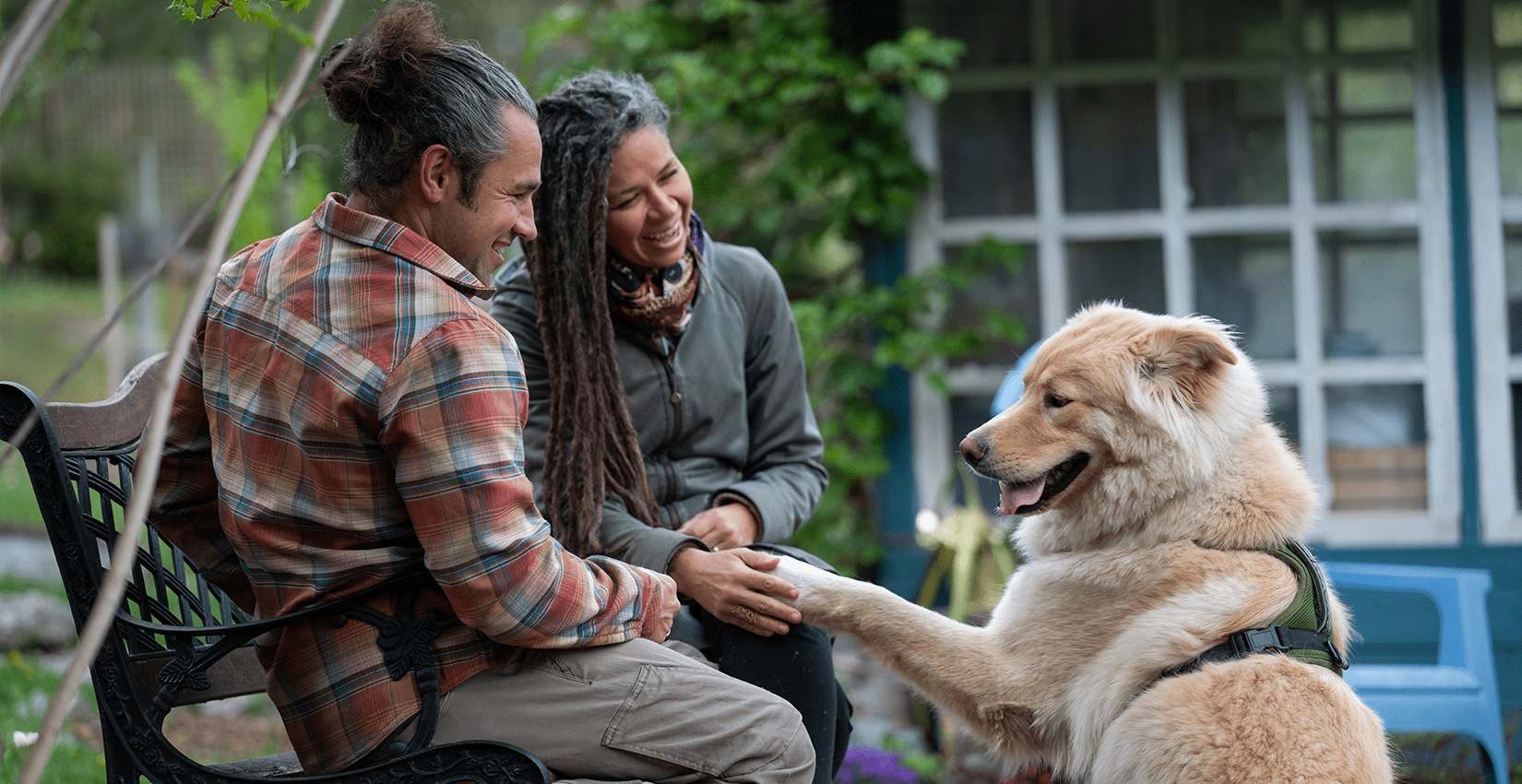About animal fostering
You provide love, care and a temporary home to foster animals, and we provide the food, supplies, and medical care they need. This is a flexible volunteer opportunity and foster placements can range from a few days to a few months.

Some important things you should know:
- Fosters, or lead fosters in a family, must be 19+ years of age and have housing where pets are permitted.
- BC SPCA foster animals can be fearful, have complex medical needs, or require specific behavioural support. Our training will prepare you and we’re here to support along the way!
- Fostering makes a direct impact on animals in need, can bring joy to volunteers, and strengthen family bonds. It’s also a great way to gain valuable skills for future careers in animal care.
Is fostering with the BC SPCA Right for You?
1. Watch the video
2. Take the quiz
 This 10-question quiz is here to help you assess whether or not fostering with the BC SPCA is the right volunteer role for you.
This 10-question quiz is here to help you assess whether or not fostering with the BC SPCA is the right volunteer role for you.
START NOW
Please note this quiz will open in a new tab or window.
3. Join our fostering team
 The BC SPCA is always looking for dedicated people to help animals in need. There are a variety of programs for fostering animals across BC.
The BC SPCA is always looking for dedicated people to help animals in need. There are a variety of programs for fostering animals across BC.
APPLY HERE
Please note this button will open in a new tab or window.
Frequently asked questions for foster candidates
Why fostering matters
Fosters sign up to help provide temporary homes to animals in the care of the BC SPCA who are not yet ready for adoption or for pets requiring emergency boarding for reasons such as evacuation due to wildfires. Individuals who are labelled “foster-to-adopt” have been approved to adopt and provide a permanent home to a certain animal(s); however, the animal may still need medical procedures such as spay/neuter. As these procedures are paid for by the BC SPCA they must officially be under their care, so are referred to as ‘foster-to-adopt.’ Once that condition is met, the adoption will become official, and care/responsibility will transfer to their new guardians.
Fostering with the BC SPCA has many benefits. You help animals in need by giving them a safe place to stay, which helps them find forever homes. Fostering can bring joy and give you a sense of purpose. It’s also a great way for families to work together- teaching children responsibility and kindness.
Fostering helps animal centres make room for more animals and is a wonderful way to make a difference in your community while learning skills that could help in a future career with animals.
BC SPCA fosters, like all of our volunteers, get access to exclusive events, news, and perks, including discounts to the BC SPCA Shop and BC Pet Registry.
Many BC SPCA foster animals need special care. They might feel scared, have health problems, or need help with behaviour.
Animal centres can be noisy and scary for some animals. They need a safe and quiet place to recover from being sick or hurt, or to learn to trust people.
Newborn animals have under-developed immune systems and are at higher risk for infection. They also need socialization in a home environment and a calm space to have good experiences as they grow.
Fosters provide safe, caring spaces where animals can grow and prepare for adoption. Fosters supporting the Emergency Response and Safekeepers Programs help to keep pets with their families.
When animals stay in foster homes, animal centres have more space to care for animals in need. Fosters also provide temporary relief for one another, building communities of animal care.
Becoming a foster at the BC SPCA
The process takes a few weeks and includes:
- Completing an online application (less than 5 minutes).
- A chat with our team to discuss your expectations and learn more about the role (about 30-45 minutes).
- Online training (approximately 1-2 hours of reading and videos).
Thanks in advance for being patient and dedicated to this process. It’s worth it!
All volunteers who join our team, including fosters, are screened and trained to help us maintain high standards of transparency and accountability. Completing training is considered an aspect of volunteering and this time is recorded as volunteer hours.
Many BC SPCA foster animals need special care. They might feel scared, have health problems, or need help with behaviour.
Even if you have cared for animals before, every foster animal is different. The questions we ask help us understand your experience and match you with an animal that needs you. Our training helps you provide the same level of care these animals would get from staff or volunteers in our animal centres or with experienced fosters.
Yes! You don’t need experience to foster for the BC SPCA. We’ll help match you with an animal that fits your lifestyle and give you the training and support you need. As you gain experience, you may be able to foster animals with special needs.
Fostering an animal is very different from typical pet companionship. If you’re looking for a pet, please visit our adoptions page.
The BC SPCA’s foster program supports all domestic animals of all ages, including dogs, cats, and small animals like rabbits, gerbils, birds, and rats.
The BC SPCA also fosters out horses and farm animals such as chickens and pigs through the Horse and Farm Animal Foster Program.
Foster volunteers always have a choice of what types of animals they want to foster and can change their foster preferences online at any time.
Preparing your home for a foster animal
Yes, if all your own pets are spayed/ neutered (if applicable), have up-to-date vaccinations and parasite control prevention. These measures help prevent illness and accidental litters.
If your own pets get sick from your foster animals, the BC SPCA will not cover their medication costs or vet visits.
From time to time, foster animals need to be separated from your own pets. The BC SPCA would provide guidance on how to do so when this happens.
Finally, you should consider the stress resident pets may feel from sharing space with foster animals. Even if they cannot see one another, they might get stress from smelling or hearing one another. Our team can assist with facilitating gradual introductions to reduce the stress on both foster animals and resident pets.
Yes, but you will need permission from your landlord. Check out the BC SPCA’s renter’s guide for resources that might help you.
Fostering is a great way to help animals, but it’s important for everyone in your household to know what to expect and how an animal in the home would affect them.
All animals, including foster animals, can be a little messy. They might spill food or water, chew on furniture or shoes, or have accidents if they are not house trained yet. The BC SPCA can help you avoid or minimize damage that comes with animal care but will not replace or reimburse for damaged items.
Many foster animals need a calm and quiet home. Loud noises or lots of visitors can make them feel scared or stressed. If your home is usually busy or noisy, the BC SPCA can help you decide if fostering is right for you or place you with the best animal for your home, such as young puppies and kittens who are being socialized and will thrive in that type of environment.
Fostering is a wonderful experience for the whole family. It teaches kindness, patience, and how to care for animals in need. The BC SPCA will give you all the help and support you need to make fostering a success!
Foster animals need a safe, clutter-free space in your home to sleep, play, and recover. This space should have enough room for essentials such as a pet bed, litter box (if needed), food and water dishes, and space to sleep and play. Ideally, this space has easy-to-clean floors, like tile or laminate to help prevent spreading disease between animals or to humans.
Make sure to remove dangerous items, such as cleaning supplies, medications, food or plants toxic to animals, and store them in a safe place. If you’re using a bathroom or spare room, be sure to remove breakables, close the toilet lid, tuck away cords, and check for other common hazards.
For a mom and her babies, or for an animal recovering from illness or injury, a dedicated “foster room” is required. This space should have natural light, a door that closes, and easy-to-clean floors to create a safe and supportive environment for the animal.
If you plan on fostering dogs, it is not necessary to have a fenced yard in all cases.
Commitment and care of foster animals
Foster placements with the BC SPCA vary in length. Some are for just one night or a weekend, others are longer like a few weeks or even several months.
When the BC SPCA shares information about an available foster animal, we always provide an estimate on how long their placement might last.
The time depends on the animal’s needs. Most animals need at least one to two hours of care and attention each day, given multiple times throughout the day.
This might include feeding and changing water supplies three or four times each day, petting the animal while you watch TV, cleaning up after the animal poops, and playing with the animal to give them exercise. As the primary foster, you can involve other members of your household in animal care and even encourage them to review training information with you.
Some animals, like bottle-fed babies or those recovering from sickness, may need care every two to three hours, even at night. Spending this time helps the foster animals feel safe and comfortable.
Another thing to consider around your time is your responsibility for taking foster animals to and from their appointments. These appointments are usually scheduled on weekdays between 8am and 5pm. They can be frequent, sometimes once or twice each week, and may be scheduled on short notice.
Your observations while caring for the foster animal help them get adopted and thrive. If you’re unsure about the time needed for a specific foster animal, the BC SPCA team is here to help!
The BC SPCA provides all necessary supplies. Food, and supplies like toys, litter, pet-friendly cleaning supplies, vet care, and training, to make fostering easy and enjoyable for you and your foster pet.
Fosters cover costs for transporting animals to and from appointments, including fuel, vehicle maintenance or taxi/ rideshare fees. These appointments are usually scheduled on weekdays between 8am and 5pm. They can be frequent, sometimes once or twice each week.
Fosters may need to do more laundry than usual or choose to use materials like paper towel for cleaning. These costs should also be considered when thinking about fostering.
The BC SPCA reimburses fosters for pre-approved expenses like greens for small animals. Please keep your receipts and make sure you have expense approval before making new purchases.
We want fostering to be a positive experience for both you and the animals.
When we don’t have much history on an animal, it can be hard to know if a placement will work until they are in your home. If the animal isn’t a good fit, that’s okay!
Let your foster support contact know, and we’ll arrange alternative care for the animal. We’ll also use what we’ve learned to find them another foster home and match you with an animal that’s a better fit for you and your home.
If you need to take a break, reach out to your foster support contact. The BC SPCA will arrange alternate care for the foster animal. Life happens and we are here to support you.
Fostering animals can be rewarding, but it can also be hard. Sometimes animals, including foster animals, may have serious health problems. Even with the best care, some animals may pass away or need to be euthanized to stop their suffering. This can be very sad, but it’s part of giving them love and care while they are with you. The BC SPCA provides mental health supports whenever this happens and as part of the overall foster experience. If a foster animal gets sick or hurt, or if a person or another animal is injured, it’s important to tell the BC SPCA right away so we can help. The BC SPCA provides training and support to help you through these challenges. We also connect you with other fosters, so you don’t feel alone. While fostering, you may also care for animals who have been abused or neglected by other humans. This can be upsetting but the BC SPCA is here to support. Fostering can be difficult at times, but knowing you’ve helped an animal feel safe and loved makes it worth it. No, foster animals must be treated by veterinarians working with the BC SPCA. These vets are familiar with the animal’s medical history and follow BC SPCA protocols to ensure consistent care. They also know who to contact if additional care or decisions are needed. While many excellent veterinarians are in our communities, we ask that foster animals see BC SPCA partner vets , which may include accessing telemedicine or virtual appointments, to keep their care consistent and aligned with our records. If you take your foster animal to your own vet, you would be responsible for the cost of that care. Additionally, community vets are often very busy, and sharing medical history with a new clinic could delay treatment. Using BC SPCA partner vets ensures the best and most efficient care for foster animals. To make things easy for you, we will provide you with a list of emergency contacts so you’ll be able to access the right support 24/7. Saying goodbye to a foster animal once they are adopted can be tough because you build a bond while caring for them. If you or someone you know wants to adopt your foster animal, let the foster team know and they will support you with next steps. The BC SPCA considers all adoption applications carefully. Our goal is to find the best home for every animal and to help make the process as easy as possible for you. Fostering an animal is very different from typical pet companionship. If you’re looking for a pet, please visit our adoptions page.
Other questions relating to fostering
Ready to join our animal fostering team?
APPLY HERE
Please note this button will open in a new tab or window.
